by Marty | Oct 7, 2014 | Freelance SEO Copywriting Tips, General Pearls of Wisdom
 I like, and am moving to Web Hosting Buzz for hosting sites of mine, or to answer the needs of my clients.
I like, and am moving to Web Hosting Buzz for hosting sites of mine, or to answer the needs of my clients.
I have been with Bluehost and others for many years, but am eager to change, and I will tell you why.
When I first got Bluehost, in like 2008, it was much more of an issue then to have the right hosting provider for your sites. As it is now, there are many languages to achieve any specific thing…but these languages, coding and platforms used to fight a lot more back then than they do today. It polarized hosts to be one team or the other. And things like cPanel and even Linux for a while were not universal, like it is today.
So at the time, Bluehost made things I needed simple and cheap…I could get stacked Windows or Linux hosting, with an uncluttered cPanel, and not worry on it to much- so I did.
I financed it, by becoming an affiliated sales rep- I sold it, as soon as I embarked. My first sales paved my way for years-of-hosting, and it continued to pay for itself, and a little more.
I truly liked it for a while, too – it was a clean, quick host, uncluttered.
Yet over time, the things I liked about Bluehost were replaced by examples of corporate bloat. The service and support I liked on entering, were eventually melted into a 3rd world, phone-it-in kind of thing, every time. Got to where I always knew more than the support person, which sucked.
As they grew bigger, their customer support became weaker overall but it was always kind of nebulous… you might find great help or nothing- no telling which-and all of it took more time to deliver in the years progressing, every time I had to tap support for anything.
I was also experiencing some technical issues, like slow speeds, hacked sites, and down time – none of it explained to me. Ever. No central feeling here, whatsoever- every call was a new walk in the park. There was even a day when all of my sites went down for about 5 hours with only a very feeble explanation as to why.
Things were getting pretty nutty out there, but I had questions about what was happening in hosting and only one guy was constant, always, with the goods- a guy in a forum I knew named Matt Russell.

Every time there was a burble in hosting services, Matt (who runs Web Hosting Buzz, as well as Namecheap and god knows what else) would tell us all (in the forum) what happened- while Bluehost remained mute. Remember when I mentioned where all my sites in there went down for about a half day, and I was freaked? Matt privately said to me what was happening, and after a short time, it proved exactly true. Did not fix it, or assuage my freaking out then (they had to fix the servers), but it helped knowing why, and I even emailed Bluehost to fix it…and it made me realize I was getting the shaft in my hosting…I was a number to Bluehost. Everyone is.
I wanted service that was smart and dependable- like what Matt always offered. Like what I used to get from Bluehost, but saw less and less of as time went by.
I think Bluehost SUCKS.
I started moving things over to Web Hosting Buzz, and I will actively support them as my new and improved hosting option.
Immediately, the interface is SOOOOO much faster, and uncluttered by sales pitches. I also had a support thing already (I signed up like an idiot) and they answered me within an hour, and solved it for me, immediately. They also offer a service – free – to move over cPanel accounts.
Let that sink in.
Yep – they will move all your Bluehost sites out, free.
I have a bunch in Bluehost, so I am going to take them up on it. [LATER NOTE: did, it was amazing…so nice for a host to offer this-ml]
I will round out any obligations to Bluehost without seeking refunds, but I am not impressed by what growth did to a company I liked. I no longer like Bluehost, and will stop offering it as a reliable, cheap option.It may be these things for other folks, but to me, it has been a cheapie-PIA, that always seems to get worse. I quit, as an affiliate.
My needs, though kind of demanding at times, are small. I am willing to put my money on the fact a guy like Matt only does business one way…I think his company answers my needs much better than Bluehost has been doing in the last 3 years or so. Absolutely held true so far.
Web Hosting Buzz is a reliable, trustworthy and safe host, fast and easy to work with. Cheap, too. Their support rules so far.
I felt for a long time, griping was not the thing to do – either do it, or change it. But I had prepaid for 5 years at Bluehost, so was simply letting it be.
I don’t like Bluehost anymore though, not at all, and I want professional distance. In the past couple weeks, an issue occurred where automatic updates to WP installs (which is a preset in most updated sites) had a conflict with a folder permission default, so it whitescreened the sites. I had 6 of them go – but by the 3rd one, I started doing a quick update, which turned out to fix it every time. It took me hours – and I mean hours – on the phone with BH support finding the issue, and fixing it in one site – and it was me who suggested the fix. The tech was simply doing his job, but he didn’t have enough in the toolkit to help me. I helped him instead- and that is silly.
I also had a site that was having issues, so I logged into the cPanel to see what I could see – and the files literally started to disappear on me…until the entire site was gone. We (me and 2 support techs) fished a copy off a mirrored backup, but I never saw anything like that in all the years I have hosted sites. No explanation, apology or otherwise- but I spent good hours fixing that mess which turned out to be 100% on them.
Just shaky service, overdone sales pitches, and all kinds of crap I don’t want to sidestep every time I admin my accounts.
Conversely, Web Hosting Buzz seems to be a great fit—all of the service and scale-ready technology I want, at a price point I can readily afford. Love it, so far.
In.
[NOTE: Later add: loving WHB, still, months later. -ml]
by Marty | Sep 27, 2014 | General Pearls of Wisdom
I have hosted sites for over 13 years. I went to Bluehost in like 2009 I think, because I needed a simple service, offering me a cheap option for Linux.
This week, at least 5 sites I have hosted there got hit by the white screen of death.
I have fixed all but one- which had deeper issues…but all the rest, turned out to be due to a Bluehost thing.
The default permissions on a critical folder, are set to not write – so an update happening, would hit this folder and not update the files it holds. They will point out I could change the permissions here- but it is not something you do, unless very intentionally directed.
So the WordPress site, set to automatic upgrades, tried to upgrade, and did it, about 9/10ths of the way- but one file in particular on Bluehost, does not update for sure: wp-includes/formatting.php
This makes the whole site white out, and makes it impossible to admin thru WordPress.
I found, if you take the formatting.php file from a clean version of WordPress 4.0 and overwrite the local on your whited-out site (there are no unique identifiers in this file, it is a core wp file), you are gold.
Sometimes, it may be a plugin issue- but in the sites I put back online this week, all of them were on Bluehost, got whitecreened by a WP upgrade to 4.0, and all of them needed this file update.
Happily, after the first one, which took a couple hours to find and fix, this makes it fast and easy. At least to rule it out.
But God- Bluehost can suck it: I am done with these losers. Sorry for steering anyone that way, ever. They made simple muddy, and ruined the things that made them good.
by Marty | May 30, 2014 | General Pearls of Wisdom
 Being spoiled, I just got back from 2 weeks in Maui on Kaanapali Beach. Being me, I of course fished a lot of it: pretty much in fact every day there. Saw multiple sunrises and saw sunset every day I was there. Rod in hand, as is my M.O.
Being spoiled, I just got back from 2 weeks in Maui on Kaanapali Beach. Being me, I of course fished a lot of it: pretty much in fact every day there. Saw multiple sunrises and saw sunset every day I was there. Rod in hand, as is my M.O.
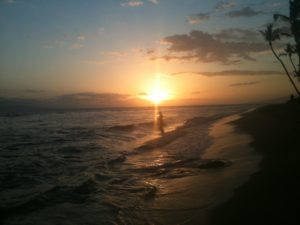 While I have never fished so far south, I had a general idea of what I’d find and got a lot of help from this one great thread about Maui fishing…yet artificial was not happening for me. Or rather, frozen squid was hitting for us every cast, so why argue with what works.
While I have never fished so far south, I had a general idea of what I’d find and got a lot of help from this one great thread about Maui fishing…yet artificial was not happening for me. Or rather, frozen squid was hitting for us every cast, so why argue with what works.
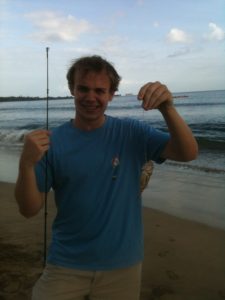 Yep- everyday was a pretty little postcard here – it is truly paradise as far as I could see. But beach fishing is different everywhere and our first plunk in, we lost so many rigs (like every other cast) on the reefs and rocks and the fish we did catch, were tiny and often weird to us. Cool to see in this regard…but not quite what we were expecting. They were all toothy and spiny, so hard for us novices to grab safely.
Yep- everyday was a pretty little postcard here – it is truly paradise as far as I could see. But beach fishing is different everywhere and our first plunk in, we lost so many rigs (like every other cast) on the reefs and rocks and the fish we did catch, were tiny and often weird to us. Cool to see in this regard…but not quite what we were expecting. They were all toothy and spiny, so hard for us novices to grab safely.
Not so easy to capture the beauty of some of the little fish either. But it was fun. When I finally did catch something bigger, it was a very nasty eel who had wrapped the steel leader around his own neck and made it really hard to grab him.
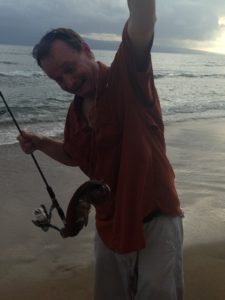 I tried to get him safely behind the head but he coiled around and tried to bite me a few times and was full-body-strong, like a shark. His jaws were pretty terrifying–coming at me with a clearly audible snapping noise that suggested a very powerful bite indeed. He was like a dinosaur that made it. Not that he made it past our encounter, but I’ll spare you the details.
I tried to get him safely behind the head but he coiled around and tried to bite me a few times and was full-body-strong, like a shark. His jaws were pretty terrifying–coming at me with a clearly audible snapping noise that suggested a very powerful bite indeed. He was like a dinosaur that made it. Not that he made it past our encounter, but I’ll spare you the details.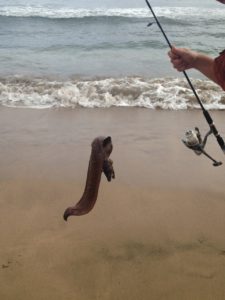
And so thru trial and error and a few days of trying various things (which tended to result in losing a lot of stuff on reefs and rocks), we found an egg slip sinker and pinch weight with a small hook holding frozen squid strips was perfect. Kind of like a pegged Carolina rig, but using egg weights pegged with a pinch weight, not bullet weights.
The huma huma nuka nuka apua’a bites back
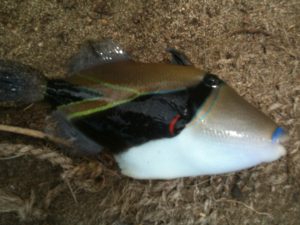 In no time, we met with the huma huma nuka nuka apua’a- a cool looking little bastard that is everywhere- and is Hawaii’s state fish. One of these guys I caught (and there were many of them) was about 3 pounds, so a fattie- I was rubbing his bottom lip to ease his mouth open and get the hook out, and he bit me on the index finger. Hard.
In no time, we met with the huma huma nuka nuka apua’a- a cool looking little bastard that is everywhere- and is Hawaii’s state fish. One of these guys I caught (and there were many of them) was about 3 pounds, so a fattie- I was rubbing his bottom lip to ease his mouth open and get the hook out, and he bit me on the index finger. Hard.
 I yelled-I swore at him, shouting “You little f-bomb!” much louder than I had intended. Some old leather-skinned guy in cheap mirrored aviators and a faded bathing suit that I could sense, much like his baked alligator skin, reeked of cigarettes, said to me with disgust: “You know its the state fish and you can’t eat him, right? You gonna throw him back, right?” I mumbled something and tried to stop the bleeding- wanting more to club the old wallet built man with the stupid state fish who bit harder than a motherhummer. But of course he, like all the fish I caught on the beach except the eel, made it back into the water, unharmed. He drew blood and my finger hurt for days, so don’t take any of these dudes for granted. Because they eat off rocks and reefs they have super strong bites, and most have teeth, though more like molars than sharp ones.
I yelled-I swore at him, shouting “You little f-bomb!” much louder than I had intended. Some old leather-skinned guy in cheap mirrored aviators and a faded bathing suit that I could sense, much like his baked alligator skin, reeked of cigarettes, said to me with disgust: “You know its the state fish and you can’t eat him, right? You gonna throw him back, right?” I mumbled something and tried to stop the bleeding- wanting more to club the old wallet built man with the stupid state fish who bit harder than a motherhummer. But of course he, like all the fish I caught on the beach except the eel, made it back into the water, unharmed. He drew blood and my finger hurt for days, so don’t take any of these dudes for granted. Because they eat off rocks and reefs they have super strong bites, and most have teeth, though more like molars than sharp ones.
All my other encounters with this fish, which were many, were very good. Made me learn how to say and spell it- and they get to be a few pounds and will hit quickly and fight, hard. I got to a point where I could feel them pick it up opposed to other fish- so catching one was something I did a lot. I saw this guy as Maui’s bluegill, and some squid would pull one out even if nothing else was anywhere close. If you beach fish in Maui/Kaanapali, you will catch the huma huma nuka nuka apua’a…it is a sure safe bet, and other than not keeping him (if you are looking for fish to eat) worth it for sure to catch a bunch. Made me popular with the tourists, who were happy to see me catching them a lot.
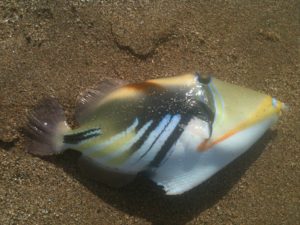 A close relative, is the Picasso triggerfish, whose stripes certainly had different shades working underwater. This little guy was pretty common, and super pretty underwater. The belly stripes on some, either reflect color or are colored differently- hard to say, but you can see it in a variety of the same fish.
A close relative, is the Picasso triggerfish, whose stripes certainly had different shades working underwater. This little guy was pretty common, and super pretty underwater. The belly stripes on some, either reflect color or are colored differently- hard to say, but you can see it in a variety of the same fish.
Triggerfish, plain looking ones, are also really common little bait-stealers. I laughed, because the guy in the thread I linked up top, calls triggerfish “Hate” and I didn’t get it until after I fished there. But they eat your bait a lot, and compared to the excellent stuff you land are more of a junk fish down here.
And though I tried local jigs, it was frozen squid all the way, that really worked. The guys at All About Fish offered some great tips and inexpensive lures to try, but artificial was not happening for me.
The gear going down and what worked for me
Being a vacationing angler always presents interesting challenges in gear. You don’t quite know what to bring, what will work, and it can be very expensive for a thing like this…extra baggage on airplanes (like rods) cost now and we were already bringing a bunch of stuff for the long stay. So my wife and I figured out the smart thing to do, was pack a smaller tackle box and some reels and buy rods on the island. We did just that, going to Costco on the way in where I found 2 cheap Shimanos for about $18 each, which seemed perfect.
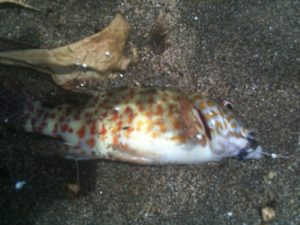 This actually was a great way to handle it, though most of the lures I brought, I stopped throwing (and losing) pretty quickly. All my hooks and stuff were much larger than what I was using – there were hilariously small hooks down there, because a lot of these fish have tiny mouths. I hit All About Fish as a local bait shop on the first day there and the guy there helped me pick out a bunch of weights and rigs. But we had 3 reels and 2 new cheap rods to allow us to get lines in the water the first night.
This actually was a great way to handle it, though most of the lures I brought, I stopped throwing (and losing) pretty quickly. All my hooks and stuff were much larger than what I was using – there were hilariously small hooks down there, because a lot of these fish have tiny mouths. I hit All About Fish as a local bait shop on the first day there and the guy there helped me pick out a bunch of weights and rigs. But we had 3 reels and 2 new cheap rods to allow us to get lines in the water the first night.
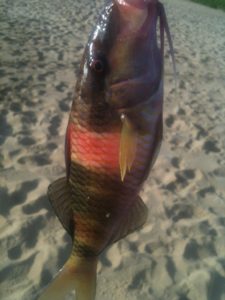 I had a spool of 15 pound test, some braided line, and some 50 pound leader. I also had a lot of coated, pre-rigged steel leaders, hooks and weights from shark fishing in Hilton Head. However, the way they suggested to fish here used a 3 way swivel- which was a way I lost a lot of rigs. In trying different things, we came up with tying a steel leader straight on the 15 pound test, and using a large egg sinker over the leader. We added in a pinch weight to peg off the egg- so your bait (conceptually) would float the length you pegged…a few feet off the bottom was working for us. This rig did not catch up as often, and allowed us to get the bait in front of different fish.
I had a spool of 15 pound test, some braided line, and some 50 pound leader. I also had a lot of coated, pre-rigged steel leaders, hooks and weights from shark fishing in Hilton Head. However, the way they suggested to fish here used a 3 way swivel- which was a way I lost a lot of rigs. In trying different things, we came up with tying a steel leader straight on the 15 pound test, and using a large egg sinker over the leader. We added in a pinch weight to peg off the egg- so your bait (conceptually) would float the length you pegged…a few feet off the bottom was working for us. This rig did not catch up as often, and allowed us to get the bait in front of different fish.
We tried variations with the braided line, but it was very hard to use compared to the mono even as leader. When you pull on a snag with braid, the braid locks down where mono has a bit more give, and you are gonna hook up a ton here. Rocks and reefs are where the fish are, so you gotta figure out how to hit them and not shred or tangle everything doing it. Plus, the waves push things around so braid getting all twisty is a pain in the butt, comparatively.
Frozen squid was cheap enough, and the hooks we got there were smaller than what I have used for crappie or trout. The hooks and egg weights were cheap, and we broke more than one hook on rocks and reef- but they were better than what I brought down and worked more than not. I still went thru a lot of them- and tying them onto a 50 pound leader was not happening…the diameter of that leader was too much for the small hooks.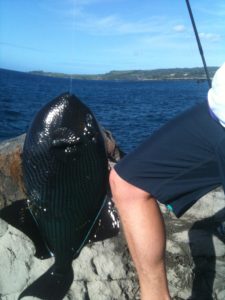
It is also important to note, we kept it to daylight shore fishing, and nights in Maui (as like most places) do bring in bigger stuff…I was unsure how our little Shimano rods would survive any true test. I have broken many rods, and besides- we konked-out early there every night after long days soaking it all up. But if you are after bigger fish, no doubt some of the same approaches in the right spots at night would pull out much bigger boys. I would suggest getting your lures there- the ones I had for stuff up here on the mainland, were not as applicable…but I am going to Florida soon, and the same box will be perfect down in the Gulf of Mexico.
What I did need, was a knife to cut squid, 15 pound test was good, egg weights and hooks by the score. Never used the bobbers I had, because the fish were down deeper than anything I wanted to put together with a float. Pre-rigged, coated leads were quick and easy, and avoided teethy cut-offs. Hit barracuda a couple times, and they simply bite off whatever was there- but I don’t think we had steel on, when we lost stuff to the barracuda. No fishing licenses needed here, which is super cool.
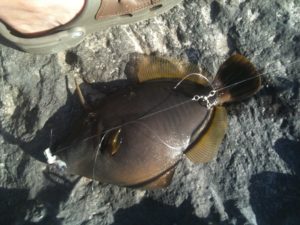 I found that a tide would affect the bite- and a faster incoming one, was better than others as it is in most places. I learned waves were pretty unpredictable, and could directly affect you- same for wind. Constant tension on the line helped a lot…had to feel the bite and set it, or risk some of them swallowing the hook pretty quickly or just missing them. The cheap, whippy rods were good for this…bigger stuff would have had less feel to it.
I found that a tide would affect the bite- and a faster incoming one, was better than others as it is in most places. I learned waves were pretty unpredictable, and could directly affect you- same for wind. Constant tension on the line helped a lot…had to feel the bite and set it, or risk some of them swallowing the hook pretty quickly or just missing them. The cheap, whippy rods were good for this…bigger stuff would have had less feel to it.
Lures, simply did not have the pull for me they typically do- squid brought everything out to play while lures never got me anything, so I did not stay with them too long.
I found places where rocks and reefs were, and fished them all up and down Kaanapali beach (can easily see them on clear days)…and caught fish, pretty much everywhere. If nothing else was there, a huma huma etc. would come and get it after a while. But the closer I could get to clearish sandy paths between rocks and reefs, the better the payoffs.
Our best day, we went to Kapalua on the suggestion of the guy in All About Fish. These were rocky cliff points about 20 feet over 20 feet of water more than offshore fishing, but they proved to be awesome to us and well worth the trip. The guy at the store circled where to park and where to go, and in Kapalua the fish were bigger and more varied- we caught them on pretty much every cast, too. Plus, there we saw some sea turtles swimming around, including a little baby one no bigger than a manhole cover…a huge plus to me.
The beach was great in the mornings and at sunset, but the Kapalua rocky cliffs were much more productive and exciting for daylight fishing.
Chartered fun
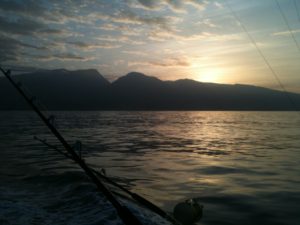 In addition to beach fishing daily, we tend to hit a guided trip in many places we visit, and Maui definitely had some awesome charters to consider. They are expensive for sure, costing us about $200+ a man each time…but considering the opportunity to tie into really monster fish, it is what it is.
In addition to beach fishing daily, we tend to hit a guided trip in many places we visit, and Maui definitely had some awesome charters to consider. They are expensive for sure, costing us about $200+ a man each time…but considering the opportunity to tie into really monster fish, it is what it is.
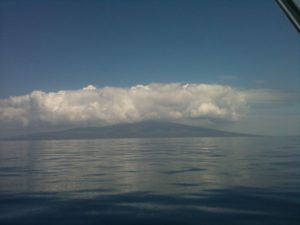 We went out on 2 of them, one being the Start Me Up out of Lahaina for a 6 hour effort. Leaving at 5:30 in the morning, we saw perfect, glass-like water as the sun rose over the volcano- which I did not realize was as rare as it was, until later. Made a very smooth ride, and we trolled about 30 miles out for pelagic fish- Mahi Mahi, Wahoo, Tuna and Marlin.
We went out on 2 of them, one being the Start Me Up out of Lahaina for a 6 hour effort. Leaving at 5:30 in the morning, we saw perfect, glass-like water as the sun rose over the volcano- which I did not realize was as rare as it was, until later. Made a very smooth ride, and we trolled about 30 miles out for pelagic fish- Mahi Mahi, Wahoo, Tuna and Marlin.
On a trolling trip, you put out huge lures on huge reels with crazy heavy line: but it is a lot of waiting, if you have never been. We got some mahi mahi a few hours in- a double hook up first, where one was landed but the other swam into the prop…and later, I got to fight a third one in. There were 6 of us on the boat, everyone with a number and if you got called, you fought the fish.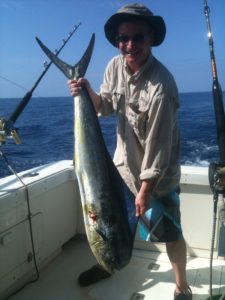
Mine was a very jumpy 30-40 pound mahi, which was exhausting but fun as hell to land. My left arm was sore for 2 days because I choked up on the pole too much- I have landed much bigger fish that were not as strong and determined. It was totally awesome.
I just loaded the video of the catch- we boat him at 5:23 or so, if you want to skip to it).
I have seen varied stories on captains with the catch afterwards- but for us, it was incredible…we got over 10 pounds of fresh Mahi, which fed us all (4 of us) multiple times. I do know the other 3 folks also got all they asked for…and the captain still had a completely untouched, beautiful Mahi to sell to a restaurant, slightly bigger than the one we fileted.
At the cleaning station, we saw two 7-8 foot Galapagos sharks cruising about 12 inches under the surface–it was actually a little unnerving for us landlubbers. I did not like standing over them, even though it was no big deal- their bite radius was bigger than my head, so I was not getting any closer. The captain was super careful to ensure nothing went into the water from the fish carcasses- this is why the sharks are a problem in this docking area. But cool to see- I should have grabbed a pic.
Know that if you go out on a charter like this, there is much more waiting than anything. The scenery is awesome, and it is relaxing as hell- made better, if the folks you share the time with are fun to talk to (which worked out very well for us, indeed). If you catch a couple, it makes it seem all OK- catching nothing, will make you leave the boat angry, so try to avoid that by knowing it is coming.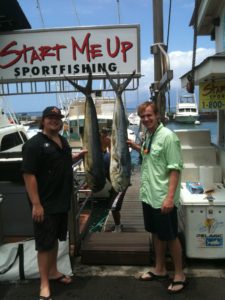
My son and our pal Trey did not get a chance to catch anything, so we took another charter the next week where it was reef fishing. On the reefs, we caught a Soldier Fish, trevally, blue lined snapper, and more – you troll out to the reef (looking for big boys) hit the reefs for definite fish, then troll back in…no big boys here, but fun stuff on the reefs.
They hooked into a 30-40 pound grey snapper that got eaten by a shark right up close to the boat – then later caught the shark, which was about a 5-6 footer that they got up close to see, then broke it off to save any risk. All our fish were fileted by the time we docked (I caught 5, Trey caught 2-3 Zach caught 1), so no pix- but we ate like champions, and out-fished the other folks on this boat. Trey says to always get the back of a party boat, which worked here.
Summing Up
If you are going to vacation in Maui and are a fishing type, you are going to be in heaven. Beach fishing is awesome, and charter presents world class experiences (but it is a gamble: these fish are not always so easy to find).
I found, bringing reels and buying cheapie rods worked well. Need a bait knife, 15-or-so pound test and you can get hooks and weights there…when you get frozen squid. Leaders were a plus…their locally popular 3 way rig was not so good for me, but a Carolina-style pegged weight was great. The number of different types of fish caught, was stunning: one of the best I have ever seen.
by Marty | Jan 30, 2014 | General Pearls of Wisdom
Fear is a natural thing. It often keeps you safe. However, unnecessary fear can be stifling – which is sad, because it is unnecessary. And in today’s very interesting SEO landscape, fear is making decisions for many people every day.
It is not their fault – fear is coming from above. FUD – fear uncertainty and doubt – are tools used by leaders to manipulate the masses. I can think of few such fine examples of FUD as the effect of one blog post last week, from Matt Cutts, head of Google’s anti-spam crusaders.
Mr. Cutts says if you are using guest posts as an SEO strategy, stop it. Which is what he should say, given his position. He says:
“So stick a fork in it: guest blogging is done; it’s just gotten too spammy. In general I wouldn’t recommend accepting a guest blog post unless you are willing to vouch for someone personally or know them well. Likewise, I wouldn’t recommend relying on guest posting, guest blogging sites, or guest blogging SEO as a linkbuilding strategy.”
Is he saying it doesn’t work? Or are we filling in that blank for him, using all the fear uncertainty and doubt caused by the implications of his statement?
And if we are doing the latter, how many times has it been the case over the last few years of incredible changes from Google?
Don’t Get all FUD’d Up Over Nothing/Everything
This reminds me a lot of the meaningless question of whether you wear a white or black hat, whether you are a good witch or a bad one. Which is another distinction that has little to no bearing on whether or not you are actually being successful online.
It also reminds me of witch hunts, of pure panic, and of babies in pure crytsalline bathwater sailing over white picket fences. Nothing good.
Personally, Matt’s edict does little to nothing to anything I will do for any one of my clients- I will still use guest posts as often as I ever have in the strategy of promoting a site. I am not blasting guest posts out of a firehose – that is not a strategy my clients have ever had in place. So the edict from on high does not affect me, that way.
What I do see happening though, is it will be increasingly more difficult for guest posts to be accepted. FUD will make webmasters scared that accepting a guest post is gonna anchor them down – or worse. That is, if they care, and are listening to what Google is dictating these days. Many webmasters don’t pay any attention at all to the statements from the ‘Plex – they are too busy, or don’t depend on organic to support them.
And bulk work will be a thing of the past.
Mostly is, and has been anyway: but this FUD should twist the knife just enough to stop the twitching.
What Is Really Happening?
Google just can’t keep up.
The web is growing so quickly, it seems sometimes like they are much stronger at the ‘Plex than they really are. Maybe a lot more than sometimes.
The whole thing with disavow and that nonsense, is you are helping Google sort out what they alone, caused. So each time you do this, you are kneeling to Google and helping them to clean up a mess that they continue to earn from…while they simultaneously make it increasingly harder for you to do likewise.
And so, just stop it.
But don’t take my word for it- 2 of my favorite bloggers ever have chimed in, and say it really well. Rae Hoffman, in a Rant from Bitchland, has a brilliant take on Google Propaganda – and my good buddy Aaron Wall had a blisteringly complete article on disavow and what it truly means. As long as you are on SEOBook, stop over and read Peter DaVanzo’s great post too, on properly measuring business benefits. (I swear, I wrote this before reading those!)
The Algorithm Is Fallible: Google Gets Lots of Things Completely Wrong
But case in point? Let’s say you are a business owner, pretty ignorant of anything of this nature, but are looking for some good web writing to add to your efforts. You want to follow best practices, so want to find a professional to help you (you are a business owner, not a copywriter, right?). You go to Google, type in “Web writing services” and look what Google says is the most important site on the web for that phrase – Fiverr, where you can be assured your $5 is buying only the finest web writing:
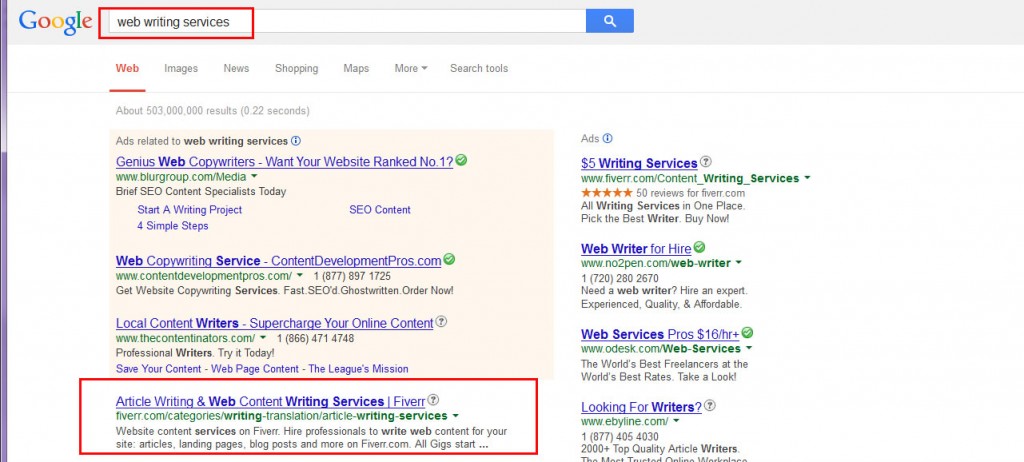
So before you go flying off into Webmaster Tools, and start maniacally disconnecting your site from everything on the web, maybe you should ask yourself: isn’t there something more productive you can be doing? Like writing a great guest post to increase visibility in your industry?
Oh wait…
by Marty | Oct 16, 2013 | Freelance SEO Copywriting Tips, General Pearls of Wisdom
 In SEO, one of the awesome things that happens is you connect to users who come in with many different queries. As your site grows and matures, it becomes a good answer for more of these kind of things, and you see that incoming searches start connecting things in ways you may not have intended, but might be very valuable. The long tail is, and always was a pretty fat place to be, if you saw it the right way.
In SEO, one of the awesome things that happens is you connect to users who come in with many different queries. As your site grows and matures, it becomes a good answer for more of these kind of things, and you see that incoming searches start connecting things in ways you may not have intended, but might be very valuable. The long tail is, and always was a pretty fat place to be, if you saw it the right way.
However, in the past year or so, it has become increasingly more difficult to get an accurate read on the long tail activity coming in from Google. A big part of it, is the (not provided) keyphrases inching up in the percentage it holds – to now, where I see it over 75% on some of the sites I track. In one site, 35% of my incoming organic leads were behind (not provided). This means, I can see what they did once in my site, but I have no true read on how they entered, or why. Makes it harder to replicate.
Or does it?
(not provided)
Many SEOs are talking about the Hummingbird update, or the latest roll-out dates for the critter updates. But the way people are searching and the way we are collecting the data is changing completely: which is bound to affect the way lots of people build and promote websites.
One thing that we are mid-thigh in, is a switch from the desktop to the handheld device. This is not anyone’s doing – it is a general move, as handheld get better, and more capable. But with this added mobility, and different presentation it might suggest, the queries people enter in are going to be smaller, and shorter. This is very significant to SEOs – for with less words to determine true meaning, Google is doing the thinking, and the connections for the user – they have to.
Hints of it were here years ago, as Google Suggest started offering to complete your idea for you. And as more data was collected, the ability to display things using a less direct keyword correlation grew. The long tail started to vanish, both from the analytic data we received and from the incoming queries themselves, as a larger and growing subsection of visits originate in a handheld.
So strategies in SEO of the past, to mine your analytics to see what people wanted, is going to be different than it was, because there is less data offered to sift.
What does this mean to you then, as you look to try to get ahead? Do you aim higher, and attempt to get into the bigger, more competitive areas?
I don’t think the answers should be necessarily clear yet, though your direction should be.
Contextual Depth FTW
The direction to take your content development is no different than it was for the last however many years you have been doing this. The unsupported page barfing was slowed by Panda, and the tiny site propped by links stalled by Penguin. So depth is not being measured in the old, blocky kind of ways – mechanical (algorithmic) things are not going to be as effective, certainly not long-term, more than not.
I was taught early on, write for the eyeballs, tweak it to the engines. I don’t see that has changed at all.
I was very adept at taking an analytics profile and mining it to find content ideas-and though it is a bit harder in most sites because of the increased obfuscation of data from the ‘Plex, it still works. However, I am much less likely to go there now for inspiration like I did before – -I am much more prone to go to outside sites, and develop ideas based on what I see in the interactions of potential audiences. As the data became harder to track in my own site, I allowed the source of it to go elsewhere to give me the same direction.
Contextual depth is going to include long tail combinations. It doesn’t matter what they tell you – they are there when a page is created the right way. So even if you can’t base the creation/edits on actual incoming keyphrase data, the contextual depth of something does not have anything to do with Google, so who cares what they are telling you? Or not?
I think the tail is still there, but it is different than it was, seen from any angle: searchers type in less, engines do more and offer less, and our own sites are trimmed more than they may have been in the past…at least created more intentionally aware of NOT stringing out thin stuff. It’s complicated, but it has some very basic principles behind it…bedrock ideas that have not changed no matter what is happening out there in La-La land.
The direction in the future, is people will be typing less to find things and Google will be filling in the blanks for them the best they can. How you become the landing pad for these queries, is the same as it ever was in many ways: you simply write for audience connection, search stability and visibility, and increased contextual depth. This is still a safe formula- it simply won’t return such a rich spread sheet to you when it is all said and done.
by Marty | Aug 31, 2013 | General Pearls of Wisdom, Reviews of Stuff
 I have been lucky in my travels to come across some great writers to work and talk with. One of them I have known both personally and professionally is the author S.R. Johannes – or as I know her, Shelli.
I have been lucky in my travels to come across some great writers to work and talk with. One of them I have known both personally and professionally is the author S.R. Johannes – or as I know her, Shelli.
Shelli and I go back a long time – though we don’t see too much of each other any more. In the decade or so that I have known her, she has worked on some projects with me and was a fabulous writer who was always dependable. However, doing the corprate stuff was not her goal, and she was busy working on her own fiction as well as bringing up her 2 beautiful kids.
SR Johannes is now an award winning author, always receiving high accolades from multiple sources about her work. But more importantly, her audience LOVES them even more, and it is an audience that just continues to grow – her Nature of Grace series has rabid fans singing her praises and clamoring for more. They can’t seem to get enough of spunky character Grace Wells and all she encounters…allowing Shelli to create two more thrilling installments after her popular first offering hit the streets in 2011.
So You Want to be a Writer?
As a proud KSU alum, I get asked by writing classes every year to shed some light on what it means to be a writer, to me. Dr. Margaret Walters has a great class over there that opens up budding young minds to new possibilities, and interviewing a writer is part of it. I am always happy to help – the students are wonderful.
At the beginning of this year, I approached Shelli and a couple other friends who wrote in different ways, looking to create a series of interviews called So You Want to be a Writer? and addressing some common questions I hear from the KSU students. It is meant to look at some of the ideas we have as students about what it is to be a writer, compared to the actual nuts-and-bolts of the daily grind once you “arrive” (if anyone ever does) – sweat stains and all.
While my whole project idea may not have had enough steam behind it to keep going, Shelli’s answers were great, and it was a shame to be sitting in my desktop, unseen…so here you go. Dedicated to the ongoing classes of Dr. Margaret Walters at Kennesaw State University and the interviews they do – keep them at it, Margaret!
HUGE thanks for Shelli’s patience and candid answers, and apologies it did not get out here sooner…I am indebted to her once again. 🙂
———————
At what point did you determine you had a knack for writing?
I always wrote when I was little. Poems and short stories. I won a writing contest in Elementary school. But as I moved into high school, I stopped. For reasons unknown. I think business was pushed more than the arts.
Since I got a degree in marketing – I’ve always done business writing in creative ways. Ads, employee newsletters, etc. But in 2004 when my daughter was born, I read Harry Potter and got inspired to write a Fairy series. got great feedback from editors and agents but no one ever picked up the book. I knew then I could write and I’ve been writing ever since.
Who encouraged you? How?
At first, editors and agents gave me feedback around “this story stinks but you can really write.” Then, writing buddies and critique partners. Of course my family was very supportive as well, helping me find time to write.
Who discouraged you and how? How did you overcome this?
Editors and agents are discouraging in general when they give rejections. You just have to know rejections – many of them – are natural for most authors. Learn from them and don’t take it personally. Also know you are one person away from a yes. This business is subjective. It took me until my first book come out until I realized that I was good enough. That my book was good enough to sell. Before that , I took their words and criticisms as law. Keep in mind – agents and editors are always focused on what sells big. Not necessarily quality first.
What were important turning points or milestones for you, mentally or otherwise, once you decided to pursue writing more directly?
When I got an agent, I knew I was good enough to publish. Unfortunately I didn’t sell with that agent and left her. But you get nuggets of inspiration and encouragement along the way. You have to look for them though. For example: a personal note from an editor is encouraging. A fan letter from a teen saying how much she connected to your book. A writer contacting you about how much you inspire them. Or a winning a contest/award unexpectedly.
Did you go to college for writing? If so, did it help? Did it slow you down at all?
No. But I study craft by reading books, getting critiques, attending conferences and workshops. There are several writing groups SCBWI is for children book writers, Thrillerfest is for thriller writers, and RWA is for romance writers . There are groups for any genre – get involved and learn. In Georgia, there is the Atlanta writers club and the Georgia writers association.
Did you hold any writing-related jobs? Do you today?
I have a marketing degree and worked in corporate America. So I have always been a copywriter and kept busy writing even if it was business writing. I still do that now as I do fiction writing on the side.
How long did you work on your first published book? Were there others before it?
I started in 2004 and wrote a middle grade at 100,000 words. That book didn’t sell. For Untraceable which is my first published book it took 3 years. That book went through so many revisions, I think I technically wrote about 3 different books during that time.
How much of your book was complete when you started seeking someone to help publish/promote it?
All of it. Publishers and agents wont look at partial books or outlines. You need to write the book to sell it.
How many different publishers did you appeal to?
Many – I could not even count. I queried anyone who seemed like a good fit – agents or editors. Use the writers market guide to find publishing houses, editor names, and what they are looking for. You can use agentquery.com and querytracker.com to search for an agent by genre.
Were there a great number of rejections to get through? If so, how did you stay motivated?
TONS. I probably have over 150 rejection letters. You have to look for the personal rejections and hope the rejections give you feedback. If they are generic- you need to go back to square one – something is wrong. If they are personal, that means you have something special but something is missing. Use the rejections as learning tools on how to fix your manuscript. And again, know every author gets rejections. Even Stephanie Meyer (Twilight) received many rejections. After her book was bough for 6 figures, she got a rejection in the mail saying it sucked.
 What made you choose the publisher that you did?
What made you choose the publisher that you did?
After years of trying to get published, I decided to self publish. I researched online and bought books on self publishing and marketing. Self publishing is HARD and a lot of work. But at the time it was the right decision for me. I would not recommend it for everyone and I won’t do it for every book.
Did you have another job while working on your book? Do you have another job now? If so, how easy or hard is (was) it to balance both work schedules? (share any tips for staying on track)
Yes never quit your day job until money comes in regularly. You can be on top one month and then get nothing for a period of time.
Was the editing process what you had imagined it to be?
Editing is hard. My book has gone through many rounds of edits from beginning to end. And it sucks every time I have to revise. After I write a first draft, I send it to my critique partners. Once they read it, I revise it and send it to a few more. Usually in the traditional publishing process – agents and editors also provide edits. IN self publishing, I hired editors for content and copyediting.. So expect edits. They are a part of the process.
How much do you feel outside editors influenced the finished work?
I would say 20%. You have to know when to listen and when to follow your gut. I can’t explain it but I know when I see a comment if it fits or not. I don’t get upset at criticism and I don’t take it personally. I think that is hard for most writers.
How long did it take from the time you had a publisher, to the time you had a finished manuscript? Is there anything you suggest as a way for others to make this time spent more efficient or less stressful?
Manuscripts should be done when they get bought. But the editorial process can take 6 months to a year. Waiting for long periods of time when nothing is happening is part of this business and it sucks. Just write something new to keep your mind off it.
Did you have input into the cover art and jacket design?
Yes but I’m self-published. I chose my cover designer and had input into the book. The concept was all mine and exactly what I pictured. Most authors do not have any input unless it is James Patterson.
What was the moment that you finally said to yourself, “This is a finished book, written by me.”
When I saw it on the shelf! 😛
Was there any promotion of the book on its release?
Yes, tons. Mostly online. Blog tours, online ads, contests/awards, reviews etc. 
How was/is it being promoted after the fact? How much do you find you are promoting it personally?
All the time. I do marketing every day. Whether it is social networking, guesting on a blog, price changes, talking to readers, setting up signings. Etc. I don’t think you do as much marketing as a traditional author.
How many books have sold to-date?
Maybe about 20,000
Are you receiving a significant part of the earnings? Is there a break-even point? What constitutes a measure of success beyond the sheer number of books sold?
Yes. But again, I’m self-published so I get 70% of everything. In traditional publishing, you get royalties on sales and an advance but it is all dependent on the publisher. There is no magic number. It depends on what the book sells for and how many you sell.
Has the process been what you expected or how/where has it varied?
Harder. Self publishing is hard. It is a one man show. I wasn’t ever expecting this side of publishing. I spend a lot of time marketing and less time writing that I wanted.
Are you writing a book right now? What lessons from the first experience are consciously in play?
Yes, I’m always writing books – I’m an author. 🙂 My lesson, is to just write and know everyone’s path is different. I have to focus on my own paper and not worry what everyone else is doing. My lesson is to just write.
Do you look at writing the same way you did before publishing?
No I didn’t know how hard it was to get published. I just thought you wrote a book and someone bought it and put it on a shelf. But now I know it’s possible to do it so I focus on that by writing daily.
Is it time to quit the day job yet – or when does that finally happen?
When I make enough a month on a consistent basis to do only writing. My goal is by 2014. 🙂
—
Something tells me, going into fiction full time in 2014 won’t be much of a problem for SR Johannes.
My thanks to Shelli, and my wishes for a long and happy career doing what she does best.
Be sure to visit and catch-up with the author SR Johannes socially, and on the web:
 I like, and am moving to Web Hosting Buzz for hosting sites of mine, or to answer the needs of my clients.
I like, and am moving to Web Hosting Buzz for hosting sites of mine, or to answer the needs of my clients.

 Being spoiled, I just got back from 2 weeks in Maui on Kaanapali Beach. Being me, I of course fished a lot of it: pretty much in fact every day there. Saw multiple sunrises and saw sunset every day I was there. Rod in hand, as is my M.O.
Being spoiled, I just got back from 2 weeks in Maui on Kaanapali Beach. Being me, I of course fished a lot of it: pretty much in fact every day there. Saw multiple sunrises and saw sunset every day I was there. Rod in hand, as is my M.O.

 I tried to get him safely behind the head but he coiled around and tried to bite me a few times and was full-body-strong, like a shark. His jaws were pretty terrifying–coming at me with a clearly audible snapping noise that suggested a very powerful bite indeed. He was like a dinosaur that made it. Not that he made it past our encounter, but I’ll spare you the details.
I tried to get him safely behind the head but he coiled around and tried to bite me a few times and was full-body-strong, like a shark. His jaws were pretty terrifying–coming at me with a clearly audible snapping noise that suggested a very powerful bite indeed. He was like a dinosaur that made it. Not that he made it past our encounter, but I’ll spare you the details.













 In SEO, one of the awesome things that happens is you connect to users who come in with many different queries. As your site grows and matures, it becomes a good answer for more of these kind of things, and you see that incoming searches start connecting things in ways you may not have intended, but might be very valuable. The long tail is, and always was a pretty fat place to be, if you saw it the right way.
In SEO, one of the awesome things that happens is you connect to users who come in with many different queries. As your site grows and matures, it becomes a good answer for more of these kind of things, and you see that incoming searches start connecting things in ways you may not have intended, but might be very valuable. The long tail is, and always was a pretty fat place to be, if you saw it the right way. I have been lucky in my travels to come across some great writers to work and talk with. One of them I have known both personally and professionally is the author
I have been lucky in my travels to come across some great writers to work and talk with. One of them I have known both personally and professionally is the author 
 What made you choose the publisher that you did?
What made you choose the publisher that you did?